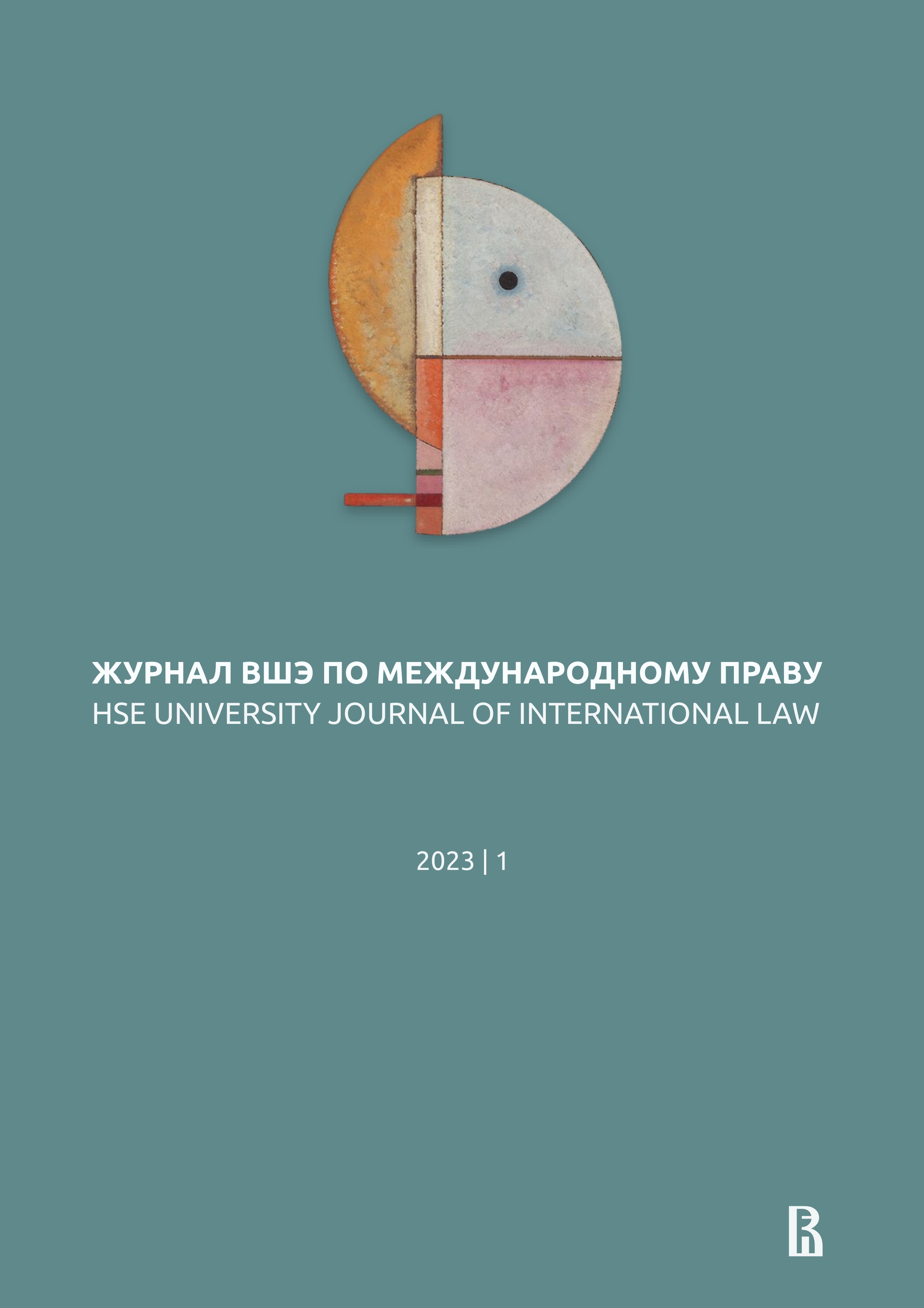Non Adimpleti Contractus and a Problem of Overinclusiveness in International Law
Abstract
This article discusses the problem of diversification of grounds for treaty suspension in international law, focusing specifically on exceptio non adimpleti contractus (exception of non-performance), which is a defence allowing the party to refuse the performance of an obligation under the legal instrument if the other party has not performed its respective reciprocal obligation. In contrast to the leading opinion, exceptio non adimpleti contractus not only exists in public international law but also creates a tangible problem of its overinclusiveness. In conjunction with clearly formulated grounds for treaty suspension in treaty law and the law of state responsibility, exceptio non adimpleti contractus enables States to extricate themselves from inconvenient treaty obligations without the burden of stiff limitations of binding rules of international law. The fluidity of exceptio non adimpleti contractus is aggravated by the fact that very few cases of its application by States have been evaluated by international tribunals. This allows States to overindulge in applying it as an unjustified means of last resort. A commonly used normative approach will not help in treating legal loopholes like the one represented by exceptio non adimpleti contractus. This article posits that the most practical strategy to tackle the problem of overinclusiveness of international law is to rely on ‘reversible rewards’ or ‘sticks and carrots’ found at the intersection of international law and behavioural economics.
Downloads
References
Aaken A. van, Simsek B. (2021) Rewarding in International Law. American Journal of International Law, vol. 115, no. 2, pp. 195–241. https://doi.org/10.1017/ajil.2021.2
Arnaud L. (2019) Fiches de droit des obligations, 6e éd., Paris: Ellipses.
Austin J. (1995) Austin: The Province of Jurisprudence Determined, Cambridge University Press. https://doi.org/10.1017/CBO9780511521546
Baldwin D. A. (1971) The Power of Positive Sanctions. Johns Hopkins University Press, vol. 24, no. 1, pp. 19–38. https://doi.org/10.2307/2009705
Ben-Shahar O., Bradford A. (2012) Efficient Enforcement in International Law. Chicago Journal of International Law, vol. 12, no. 2, pp. 375–431.
Carbonnier J. (2004) Droit civil, T. II: Les biens, les obligations. Paris: Presses Universitaires de France.
Catalinac A. L. (2010) Why New Zealand took itself out of ANZUS: Observing “Opposition for Autonomy” in Asymmetric Alliances. Foreign Policy Analysis, vol. 6, no. 4, pp. 317–338. https://doi.org/10.1111/j.1743-8594.2010.00115.x
Căzănel M. (2014) The Functions of the Exception for the Non-performance of the Civil Contract. Ovidius University Annals: Economic Sciences Series, vol. 14, no. 1, pp. 274–278.
Cortright D. (1997) The Price of Peace: Incentives and International Conflict Prevention. New York: Rowman & Littlefield Publishers, Inc. https://doi.org/10.2307/2585815
Crawford J., Olleson S. (2000) The Exception of Non-performance: Links Between the Law of Treaties and the Law of State Responsibility. Australian Year Book of International Law, vol. 21, pp. 55–74. https://doi.org/10.22145/aybil.21.4
Crawford J. (2014) State Responsibility: The General Part, Cambridge: Cambridge University Press. http://doi.org/10.1017/S0020589315000378
Dorussen H. (2001) Mixing Carrots with Sticks: Evaluating the Effectiveness of Positive Incentives. Journal of Peace Research, vol. 38, no. 2, pp. 251–262. https://doi.org/10.1177/0022343301038002009
Drezner D. W. (1999) The Trouble with Carrots: Transaction Costs, Conflict Expectations, and Economic Inducements. Security Studies, vol. 9, nos. 1–2, pp. 188–218. https://doi.org/10.1080/09636419908429399
Fellmeth A. X., Horwitz M. (2022) Guide to Latin in international law, Oxford: Oxford University Press. http://doi.org/10.1093/acref/9780195369380.001.0001
Filmus E. (2015) Sticks and Carrots in Coercive Diplomacy: Toward a Theory of Inducements, University of Chicago.
Fitzmaurice M. (2020) Angst of the Exceptio Inadimplenti Non Est Adimplendum in International Law. In: Bartels R., Paddeu F (eds.) Exceptions in International Law, Oxford: Oxford University Press, pp. 285–304. https://doi.org/10.1093/oso/9780198789321.003.0016
Fisher P., Hafner G. (1976) Aktuelle österreichische Praxis zum Völkerrecht, Berlin: Springer-Verlag.
Forlati Picchio M.L. (1974) La sanzione nel diritto internazionale, Padova: Casa Editrice Dott Antonio Milani. https://doi.org/10.2307/2200610
Forlati S., Mbengue M., McGarry B. (2020) The Gabčíkovo-Nagymaros Judgment and Its Contribution to the Development of International Law, Leiden: Brill Nijhoff. https://doi.org/10.1163/9789004428676
Gaius (1932) Four commentaries of Gaius on the Institutes of Civil Law, Commentary IV. In: Scott S. P. (ed.) The Civil Law, vol. I. Cincinnati.
Ghestin J. (2001) L’Exception d’Inexécution: Rapport Français. In: Fontaine M., Viney G. (eds.) Les Sanctions de l’Inexécution des Obligations Contractuelles. Paris: Bruselas y Paris.
Guillaume G. (2004) Terrorism and International Law. International and Comparative Law Quarterly, vol. 53, no. 3, pp. 537–548. https://doi.org/10.1093/iclq/53.3.537
Guzman A., Raustiala K. (2021) The Rarity of Rewarding. American Journal of International Law Unbound, vol. 115, pp. 195–241. https://doi.org/10.1017/aju.2021.27
Holland T. (1898) Studies in International Law and Diplomacy. Oxford: Clarendon.
Hoy B. (2021) A Line of Blood and Dirt, New York: Oxford University Press.
Koh H. (1997) Why Do Nations Obey International Law? Yale Law Journal, vol. 106, no. 8, pp. 2599–2659. https://doi.org/10.2307/797228
Koh H. (2019) The Trump Administration and International Law, New York: Oxford University Press. http://doi.org/10.1017/ajil.2019.7
Long W. J. (1996) Trade and Technology Incentives and Bilateral Cooperation. International Studies Quarterly, vol. 40, no. 1, pp. 77–106. https://doi.org/10.2307/2600932
Mackeldey F., Dropsie M. A. (1883) Handbook of the Roman Law, Philadelphia: T. & J.W. Johnson.
Posner E., Goldsmith J. L. (2003) International Agreements: A Rational Choice Approach. Virginia Journal of International Law, vol. 44, no. 1, pp. 113–143.
Rowan S. (2022) The New French Law of Contract. International Comparative Law Quarterly, vol. 66, no. 4, pp. 805–831. https://doi.org/10.1017/S0020589317000252
Vattel. E. de (1793) The law of nations: Or, principles of the law of Nature: Applied to the conduct and affairs of nations and sovereigns. A new edition, corrected. translated from the French: B. II, Ch. VIII, London: Printed for G.G.J. and J. Robinson. https://doi.org/10.1017/CBO9781139095396
Weil P. (1983) Towards Relative Normativity in International Law? American Journal of International Law, vol. 77, no. 3, pp. 413–442. https://doi.org/10.2307/2201073
Xiouri M. (2019) The Exceptio Non Adimpleti Contractus in Public International Law. International Community Law Review, vol. 21, no. 1, pp. 56–92. http://doi.org/10.1163/18719732-12341390
Yolton J. W., Yolton J. S. (eds.) (1989) The Clarendon edition of the works of John Locke: Some thoughts concerning education. Oxford University Press. https://doi.org/10.1093/oseo/instance.00016977
This work is licensed under CC BY-NC-ND 4.0


